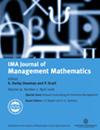On skill and chance in sport
IF 4.3
3区 工程技术
Q3 MANAGEMENT
引用次数: 1
Abstract
This work studies outcome uncertainty and competitive balance from a broad perspective. It considers four sports with varying scoring rates, from soccer with typically three goals per match to netball with one hundred goals per match. Within a general modelling framework for a two-competitor contest, we argue that outcome uncertainty, the extent to which the outcome of a contest is unpredictable, depends on scoring rate, on strength variation and on score dependence. Score dependence is essentially the tendency for scores to alternate because possession alternates and possession is advantageous. We regard competitive balance as lack of variation in strength or skill, so that when strength variation is large competitive balance is low and vice versa. Thus, we argue that the outcome of a contest depends on skill, scoring rate, score dependence and chance. This description of outcome is useful because it informs policy-making in sport about the design of scoring systems and the control of competitive imbalance. Broadly, we find that: soccer is relatively competitively unbalanced but outcomes are uncertain because the scoring rate is low; the Australian football league is competitively balanced and so outcomes are uncertain in spite of the high scoring rate in this sport; international rugby matches are relatively neither competitive nor uncertain so that little is left to chance; and netball matches have uncertain outcomes because scores are positively dependent.论体育运动中的技巧与机会
这项工作从广泛的角度研究了结果的不确定性和竞争平衡。它考虑了四项得分率不同的运动,从通常每场比赛进三球的足球到每场比赛进一百球的无网篮球。在两名参赛者比赛的通用建模框架内,我们认为结果的不确定性,即比赛结果的不可预测程度,取决于得分率、力量变化和分数依赖性。得分依赖性本质上是得分交替的趋势,因为控球是交替的,控球是有利的。我们将竞争平衡视为力量或技能缺乏变化,因此当力量变化较大时,竞争平衡较低,反之亦然。因此,我们认为比赛的结果取决于技巧、得分率、得分依赖性和机会。这种对结果的描述是有用的,因为它为体育决策提供了有关评分系统设计和控制竞争失衡的信息。总的来说,我们发现:足球在竞争中相对不平衡,但由于得分率低,结果不确定;澳大利亚足球联赛在竞争中是平衡的,因此尽管这项运动的得分率很高,但结果并不确定;国际橄榄球比赛相对来说既没有竞争性,也没有不确定性,因此几乎没有机会;无网篮球比赛的结果是不确定的,因为分数是正相关的。
本文章由计算机程序翻译,如有差异,请以英文原文为准。
求助全文
约1分钟内获得全文
求助全文
来源期刊

IMA Journal of Management Mathematics
OPERATIONS RESEARCH & MANAGEMENT SCIENCE-MATHEMATICS, INTERDISCIPLINARY APPLICATIONS
CiteScore
4.70
自引率
17.60%
发文量
15
审稿时长
>12 weeks
期刊介绍:
The mission of this quarterly journal is to publish mathematical research of the highest quality, impact and relevance that can be directly utilised or have demonstrable potential to be employed by managers in profit, not-for-profit, third party and governmental/public organisations to improve their practices. Thus the research must be quantitative and of the highest quality if it is to be published in the journal. Furthermore, the outcome of the research must be ultimately useful for managers. The journal also publishes novel meta-analyses of the literature, reviews of the "state-of-the art" in a manner that provides new insight, and genuine applications of mathematics to real-world problems in the form of case studies. The journal welcomes papers dealing with topics in Operational Research and Management Science, Operations Management, Decision Sciences, Transportation Science, Marketing Science, Analytics, and Financial and Risk Modelling.
 求助内容:
求助内容: 应助结果提醒方式:
应助结果提醒方式:


